重点短语和句型
- 格式:doc
- 大小:48.50 KB
- 文档页数:4
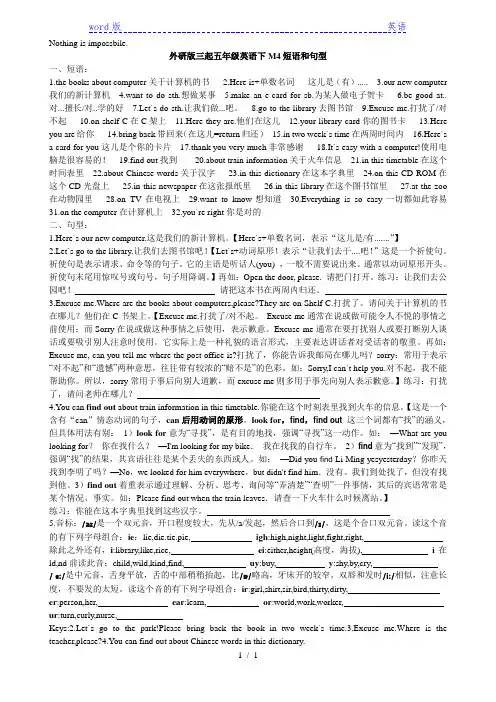
word版英语Nothing is impossbile.外研版三起五年级英语下M4短语和句型一、短语:1.the books about computer关于计算机的书2.Here is+单数名词这儿是(有).....3.our new computer 我们的新计算机4.want to do sth.想做某事5.make an e-card for sb.为某人做电子贺卡6.be good at..对...擅长/对..学的好7.Let`s do sth.让我们做...吧。
8.go to the library去图书馆9.Excuse me.打扰了/对不起10.on shelf C在C架上11.Here they are.他们在这儿12.your library card你的图书卡13.Here you are给你14.bring back带回来(在这儿=return归还)15.in two week`s time在两周时间内16.Here`s a card for you这儿是个你的卡片17.thank you very much非常感谢18.It`s easy with a computer!使用电脑是很容易的!19.find out找到20.about train information关于火车信息21.in this timetable在这个时间表里22.about Chinese words关于汉字23.in this dictionary在这本字典里24.on this CD-ROM在这个CD光盘上25.in this newspaper在这张报纸里26.in this library在这个图书馆里27.at the zoo 在动物园里28.on TV在电视上29.want to know想知道30.Everything is so easy一切都如此容易31.on the computer在计算机上32.you`re right你是对的二、句型:1.Here`s our new computer.这是我们的新计算机。
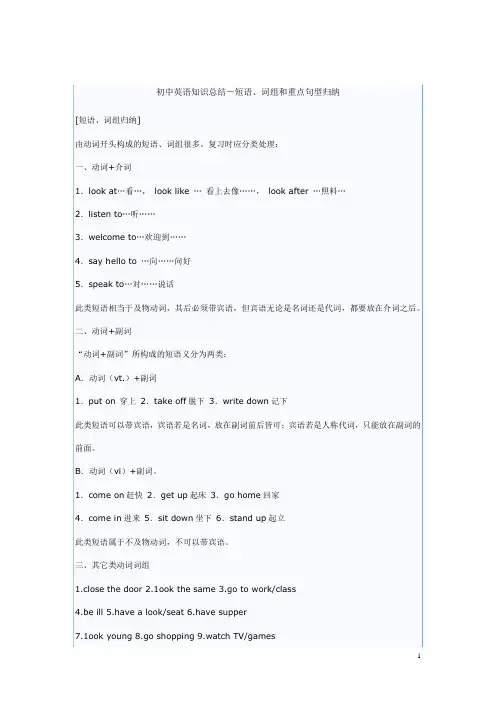
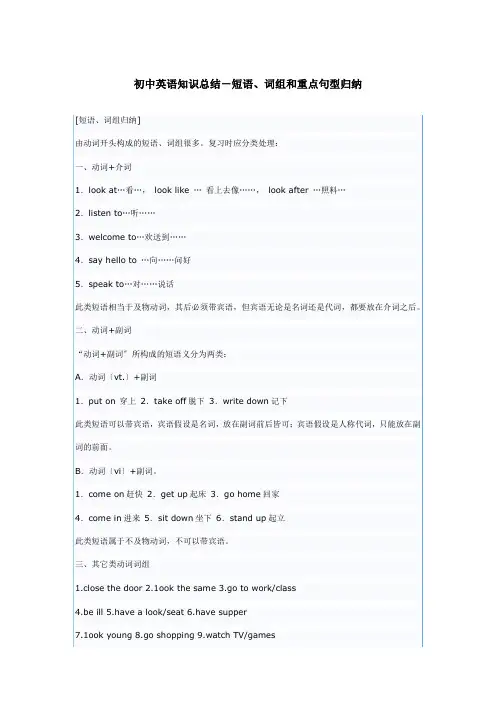
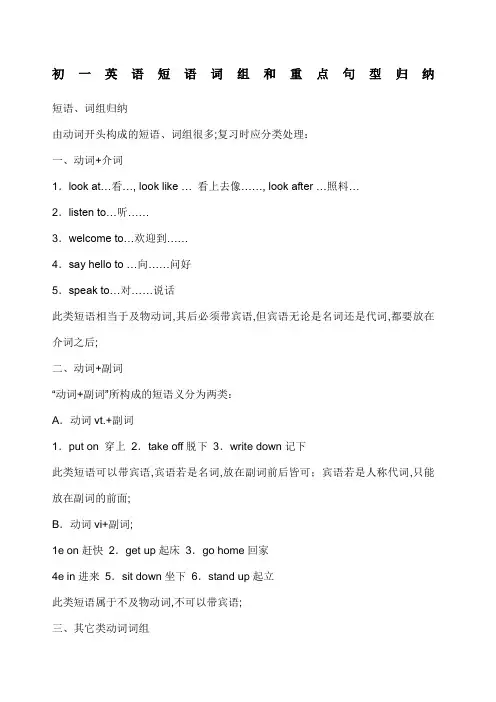
初一英语短语词组和重点句型归纳短语、词组归纳由动词开头构成的短语、词组很多;复习时应分类处理:一、动词+介词1.look at…看…, look like … 看上去像……, look after …照料…2.listen to…听……3.welcome to…欢迎到……4.say hello to …向……问好5.speak to…对……说话此类短语相当于及物动词,其后必须带宾语,但宾语无论是名词还是代词,都要放在介词之后;二、动词+副词“动词+副词”所构成的短语义分为两类:A.动词vt.+副词1.put on 穿上2.take off脱下3.write down记下此类短语可以带宾语,宾语若是名词,放在副词前后皆可;宾语若是人称代词,只能放在副词的前面;B.动词vi+副词;1e on赶快2.get up起床3.go home回家4e in进来5.sit down坐下6.stand up起立此类短语属于不及物动词,不可以带宾语;三、其它类动词词组the door the same to work/class a look/seat supperyoung shopping TV/games 10. play games介词短语聚焦“介词+名词/代词”所构成的短语称为介词短语;现将Unitsl-16常用的介词短语按用法进行归类;1.in+语言/颜色/衣帽等,表示使用某种语言或穿着……;2.in + Row/ Team/ Class/ Grade等,表示“在……排/队/班级/年级”等;3.in the morning/ afternoon/ evening/ 表示“在上午/下午/傍晚”等一段时间; 4.in the desk/ pencil-box/bedroom 等表示“在书桌/铅笔盒/卧室里”;5.in the tree表示“在树上非树本身所有”;on the tree表示“在树上为树本身所有”; 6.in the wall表示“在墙上凹陷进去”;on the wall表示“在墙上指墙的表面”; 7.at work在工作/at school上学/at home在家应注意此类短语中无the;8.at + 时刻表示钟点;9.like this/ that表示方式,意为“像……这/那样”;10.of短语表示所属关系;11.behind/ beside/ near/ under+ 名词等,表示方位、处所;12.from与to多表示方向,前者意为“从……”,后者意为“到……”;另外,以下这些短语也必须掌握;如:on duty, after breakfast, at night, at the door, in the middle, in the sky, on one’s bike等;重点句型大回放1.I think…意为“我认为……”,是对某人或某事的看法或态度的一种句型;其否定式常用I don’t think…,2.give sth. to sb./ give sb. sth. 意为“把……给……”,动词give之后可接双宾语,可用这两种句型;若指物的宾语是人称代词时,则只能用give it/ them to sb. 3.take sb./ sth. to…意为“把……送带到……”,后常接地点,也可接人; 4.One…, the other…/One is…and one is…意为“一个是……;另一个是……”,必须是两者中;5.Let sb. do sth. 意为“让某人做某事”,人后应用不带to的动词不定式,其否定式为Don’t let sb,do sth.,或Let sb. not do sth. 另外,Let’s 与Let us的含义不完全相同,前者包括听者在内,后者不包括听者在内,6.help sb. to do sth./help sb. with sth.意为“帮助某人做某事”,前者用不定式作宾补,后者用介词短语作宾补,二者可以互换.7.What about…/How about…意为“……怎么样”是用来询问或征求对方的观点、意见、看法等;about为介词,其后须接名词、代词或V-ing等形式;8.It’s time to do…/ It’s time for sth. 意为“该做……的时间了”,其中to后须接原形动词,for后可接名词或V-ing形式;9.like to do sth./ like doing sth.意为“喜欢做某事”, 前一种句型侧重具体的一次性的动作;后一种句型侧重习惯性的动作, 10.ask sb.not to do sth. 意为“让某人不要做某事”,其中ask sb.后应接动词不定式, 11.show sb. sth. / show sth. to do. 意为“把某物给某人看”,该句型的用法同前面第2点; 12.introduce sb. to sb. 意为“把某人介绍给另一人”;introduce to sb.则是“向某人作介绍”;重点短语快速复习1. kinds of 各种各样的2. either…or…或者……或者……,不是……就是…… 3. neither…nor…既不……也不…… 5. take a seat 就坐 6. home cooking 家常做法7. be famous for 因……而着名8. on ones way to在……途中9. be sick/ill in hospital生病住院10. at the end of在……的尽头,在……的末尾11. wait for 等待12. in time 及时13. make one’s way to…往……艰难地走去14. just then 正在那时15. first of all 首先,第一16. go wrong 走错路17. be/get lost 迷路18. make a noise 吵闹,喧哗19. get on 上车20. get off 下车21. stand in line 站队22. waiting room 候诊室,候车室23. at the head of……在……的前头24. laugh at 嘲笑25. throw about 乱丢,抛散26. in fact 实际上27. at midnight 在半夜28. have a good time=enjoy oneself玩得愉快29. quarrel with sb. 和某人吵架30. take one’s temperature 给某人体温31. have/ get a pain in…某处疼痛32. have a headache 头痛33. as soon as… 一……就…… 34. feel like doing sth. 想要干某事35. stop…from doing sth. 阻止……干某事36. fall asleep 入睡37. again and again再三地,反复地38. wake up 醒来,叫醒39. instead of 代替40. look over 检查41. take exercise运动42. had betternot do sth. 最好不要干某事43. at the weekend 在周末44. on time 按时45. out of从……向外46. all by oneself 独立,单独47. lots of=a lot of 许多48. no longer/more=not…any longer/more 不再49. get back 回来,取回50. sooner or later迟早51. run away 逃跑52. eat up 吃光,吃完53. run after 追赶54. take sth. with sb. 某人随身带着某物55. takegood care of…=look after…well 好好照顾,照料56. think of 考虑到,想起57. keep a diary 坚持写日记58. leave one by oneself 把某人单独留下59. harder and harder 越来越厉害60. turn on打开电灯、收音机、煤气等61. turn off 关重温重点句型1.So + be/助动词/情牵动词/主语.前面陈述的肯定情况也适于另一人物时,常用到这种倒装结构,表示“另一人物也如此;”前面陈述的否定情况也适于另一人物时,常用“Neither/ Nor + be/助动词/情态动词+主语.”这种倒装结构; 注意:“So+主语+be/助动词/情态动词.”这一句型常用于表示赞同,进一步肯定对方的看法,表示“的确如此;”“是呀;”2.Turn right/left at the first/second/…crossing. 这一指路的句型意为“在第一/二/……个十字路口向右/左拐;”相当于Take the first /second/…turning on theright /left.3.It takes sb.some time to do sth.此句型表示“干某事花了某人一段时间;”其中的it是形式主语,后面的动词不定式短语才是真正的主语.4.…think/find + it + adj. + to do sth. 此句型中的it是形式宾语,不可用其它代词替代,形容词作宾语的补足语,后面的动词不定式短语才是真正的宾语;5.What’s wrong with…此句型相当于What’s the matter/ trouble with…后跟某物作宾语时,意为“某物出什么毛病了”后跟某人作宾语时,意为“某人怎么了”6.too…to…在so…that…复合句中,that后的句子是否定句时,常与简单句too…to…太……而不能……进行句型转换; 在so…that…复合句中,that后的句子是肯定句时,常与简单句…enough to…进行句型转换.重点句型、词组大盘点1. She used to be a Chinese teacher. 她过去是一位汉语老师; 用法used to + 动词原形,表示过去经常性的动作或存在的状态,含有现在不再如此之意; 搭配used to do的否定式可以是usedn’t to do或didn’t use to do. 比较usedto do sth. 过去常做某事;be/ get used to doing sth. 习惯于做某事;be used to do sth. 被用来做某事;matter what the weather is like…无论天气…… 用法no matter what 相当于whatever,其意为“无论什么”,引导状语从句; 拓展类似no matter what的表达方式还有:no matter when无论什么时候no matter where无论什么地方no matter who无论谁no matter how 无论怎么样4. A young man practised speaking English with Mr. Green. 一位年经人与格林先生练习讲英语; 用法practise doing sth. 表示“实践、练习做某事”; 拓展practice名词,“实践”、“实施”、“练习”;put a plan into practice实行某计划;5. He encouraged everyone to take part in protecting our lakes, rivers, seas and oceans.他鼓励大家参加保护我们的湖泊、河流和海洋的活动;用法1encourage用作动词,意思是“鼓励”、“支持”;2take part in“参加”,常表示参加活动;3protect 是动词,表示“防御”、“保护”;搭配1encourage sb. in sth.在某事上鼓励或支持某人encourage sb. to do sth.鼓励某人干某事2protect sh. from sth.使某人不受某事侵袭或伤害6. …to warn people about sharks in the water. ……警告人们当心水里的鲨鱼; 用法warn用作动词,意思是“警告”、“警戒”; 搭配1warn sb.+ that从句2warn sb. of sth. 警告某人某事3warn sb. to do sth.告诫某人做某事4warn sb. againstdoing sth.告诫某人当心某事/不要做某事重点句型、词组大盘点 1. She used to be a Chinese teacher. 她过去是一位汉语老师; 用法used to + 动词原形,表示过去经常性的动作或存在的状态,含有现在不再如此之意; 搭配used to do的否定式可以是usedn’t to do或didn’t use to do. 比较used to do sth. 过去常做某事;be/ get used to doing sth. 习惯于做某事;be used to do sth. 被用来做某事; ……人称代词:是用来表示人的代词,有单数和负数之分,有主格和宾格之分;人称代词的主格在句中作主语;人称代词的宾格在句中作宾语,是作动词或介词的宾语;主格:I, we, you, he, she, it, they在句子中作主语;宾格:me, us, you, him, her, it, them在句子中作宾格;He and I are in the same class. 我和他在同一个班级;Can you see them in the street 你能看见他们在街上吗祈使句祈使句用来表示请求、命令等,句中没有主语,肯定形式由谓语或者谓语+宾语+宾语补足语构成,否定形式则在句前加Don’ up, please. 请起立; Don’t worry. 别担心;一般现在时一般现在时表示经常性或习惯性的动作,或表示现在的特征或状态;其动词形式是:动词原形只有第三人称单数作主语时除外,要加-s其疑问句和否定句需要用助动词do或does1 肯定句用行为动词原形表示They get up very early every morning. 他们每天早晨起来很早;I visit my grandparents four times a month. 我一个月去看望祖父母四次;2 否定句用don’t + 动词原形来表示We do not go shopping on Sundays. 我们周日不去购物;I don’t think you like this colour. 我想你不喜欢这个颜色;3 一般疑问句则是把助动词do提前至句首,后面动词用原形;回答时,肯定用“Yes, 主语+do”;否定句用“No, 主语+don’t”;–Do they go to school at seven o’clock 他们七点去上学吗--Yes, they do.--Do you like this skirt 你喜欢这条裙子吗--No, I don’t. 不,我不喜欢;一般现在时用来表示经常的或习惯性的动作,常与以下的时间状语连用:often 经常,always 总是,sometimes有时,usually 通常,every day/ week 每天/ 周等;He usually goes to school by bike. 通常他骑车上学;I visit my grandparents every week. 我每个星期都去看祖父母;She is always late for class. 她总是上课迟到;My parents and I sometimes go out to eat. 我和父母有时出去吃饭;It often rains here. 这儿常常下雨;主语为第三人称单数时的一般现在时一般现在时态,当主语为第三人称单数时,谓语动词也要是第三人称单数,后要加-s或-es;He likes reading at night. 他喜欢夜里读书;She usually goes to school by bike. 她平时骑车上学;The little cat drinks milk every day. 小猫每天都喝牛奶;转换成否定句要加doesn’t,其后的动词用原形;Kelly doesn’t get up early on Saturdays and Sundays.凯丽星期六星期天起床不早;He doesn’t feel well today. 他今天感觉不舒服;转换成一般疑问句,句首用Does,其后的动词用原形;Does he have lunch at school 他在学校吃午饭吗Does it take long by train 乘火车要很长时间吗现在进行时态:概念:表示现在说话瞬间正在进行或发生的动作,也可以表示目前一段时间内或现阶段正在进行的活动;结构:由be动词am, is, are + 动词ing构成,其中be动词要与主语保持性数一致;Mary is flying a kite in the park. 玛丽正在公园里放风筝;-What are you doing now 你现在在干什么--I’m reading English. 我正在读英语;Are they drawing the pictures now 他们正在画画吗动词ing形式叫动词现在分词,其构成如下:1 直接在动词后加ingplay—playing, do—doing, talk—talking, sing--singing2 以不发音的字母e结尾的动词,先去e,再加ingmake—making, write—writing, have—having, take—taking3 以重读闭音节结尾的动词且词尾只有一个辅音字母,应双写这个辅音字母,再加ingrun—running, stop—stopping, put—putting, swim—swimming注意对现在进行时态的判断;判断一个英语句子用什么时态,主要看句子的时间状语,一般说来,每种时态都有与之相对应的时间状语;现在进行时表示现在说话瞬间正在进行或发生的动作;因此,这个时态最常用的时间状语是now;但有不少句子并没有now,只能通过提示语如look、listen等或者通过上下文来确定用现在进行时;She is cleaning her room now. 她正在打扫房间;Look The girl is dancing over there. 看那个女孩在那里跳舞;--Can you go and play games with me 你能和我们一起做游戏吗--Can’t you see I am doing my homework 你没看见我正在做作业吗介词用法:1 具体时间前介词用at;He gets up at half past seven every day. 他每天七点半起床;She goes to bed at eleven o’clock. 她十一点睡觉;2 表示“在早上,在下午,在晚上”的短语中用介词in,且定冠词the不能省略;表示“在中午,在夜里”的短语中介词用at,不加冠词;in the morning在早上,in the afternoon 在下午,in the evening 在晚上at noon在中午,at night在夜里3 表示“在某天”、“在某天的上午、下午等”的短语用介词on;What do you usually do on Monday morning 星期一上午你通常做什么Do you sometimes go out to eat on Friday evening有时你星期五晚上出去吃饭吗4 在this, last, next, every等词前面既不加介词,也不用冠词;What are you doing this afternoon 今天下午你做什么He visits his grandma every Friday. 他每个星期五都去看望祖母; She is going to Shanghai next Monday. 她下个星期一去上海;。
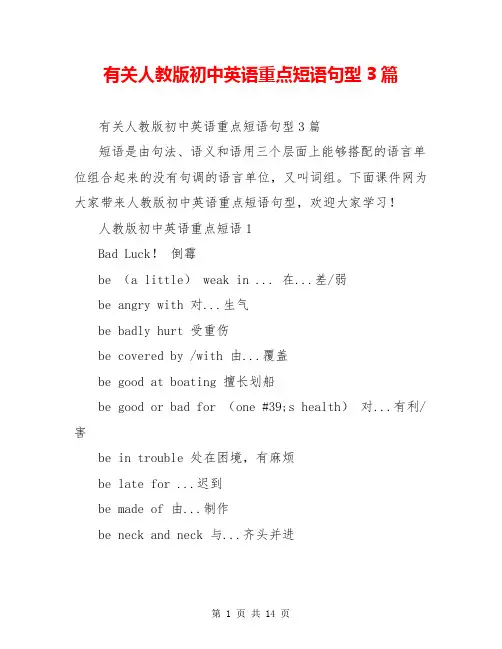
有关人教版初中英语重点短语句型3篇有关人教版初中英语重点短语句型3篇短语是由句法、语义和语用三个层面上能够搭配的语言单位组合起来的没有句调的语言单位,又叫词组。
下面课件网为大家带来人教版初中英语重点短语句型,欢迎大家学习!人教版初中英语重点短语1Bad Luck!倒霉be (a little) weak in ... 在...差/弱be angry with 对...生气be badly hurt 受重伤be covered by /with 由...覆盖be good at boating 擅长划船be good or bad for (one #39;s health)对...有利/害be in trouble 处在困境,有麻烦be late for ...迟到be made of 由...制作be neck and neck 与...齐头并进be open/closed at this time of day 一天中的这时候开/关着be terribly ill 生重病be the right size 尺寸合适be used for = used as 被用来做be widely used 得到广泛运用be worn out 被穿破,累坏了be/feel worried about 对...担心bee/be/feel interested in 对...感兴趣before the sun rose = before it was light 在日出前Best wishes (for...)!谨祝...Better late than never. 亡羊补牢(犹未迟)break down (机器/车...)出故障business hours 营业时间by the end of 到...结束时by the way 顺便说说by then 到那时catch a bus 赶公车catch a cough /headache 患感冒/头痛catch up with 赶上change one #39;s mind 改变主意Chinese take-aways 中餐/国外卖Christmas Day 圣诞日Classes are over at 5 课5点结束clothing shop 成衣店e / get back 回来e along = e on. 快点e and meet sb. 来见某人e down/up the ladder 顺着楼梯下/上e round the corner 从(街)角拐了过来e round to dinner 过来(我家)吃饭e straight to ... 径直...到跟前e with me = follow me 跟我来Congratulations!(to sb. on sth.)祝贺(某人某事)copy one #39;s exle 模仿某人(样子)cry harder and harder 哭得越来越凶cut down 砍倒Did you have a good journey 你旅途愉快吗different kinds of 不同种类的do housework/homework 做家务do one #39;s best 尽某人所能do the washing/shopping 洗洗涮涮do well in ...做得好Do you know the English for ... 你知道...英语怎么说Do you want a go 你想试一试吗Don #39;t crowd around sb. 别围观某人Don #39;t worry. 别担心draw some pictures 画些图画dress up (in a red coat)打扮好drop maths 数学没学好(drop)early in the morning 大清早ever since 自从every five minutes 每隔五分钟every time sb. ... 每当某人...人教版初中英语重点短语2a bit expensive 有点贵a bottle/glass of 一瓶/杯a farm worker (=farmer)农民a line of mountains 一条山脉a moment later 过了片刻a piece of bread 一块面包a quarter to/past six 六点差/过一刻a red-letter day 喜庆日子a telephone call for sb. 某人的电话above zero 零度以上agree with 同意某人all by oneself 全靠自己农民a line of mountains 一条山脉a moment later 过了片刻a piece of bread 一块面包a quarter to/past six 六点差/过一刻a red-letter day 喜庆日子a telephone call for sb. 某人的电话above zero 零度以上agree with 同意某人all by oneself 全靠自己all day 一整天all over the world 全世界all the afternoon 整个下午all the same 同样地,都一样all the time 一直almost the whole day 几乎一整天answer the telephone 接电话Are we all here 我们都到齐了吗as quickly as you can (你要)尽可能快as soon as I can/as possible (我)尽可早as usual 与往常一样at a bad time of year 在年景不好时at first 起先at last 最后at noon 在中午at once 立即at one #39;s workplace 在工地at school 在学校at the (third) crossing 在第三个路口at the back/front of the classroom 在教室的前/后头at the beginning of 在...伊始at the cinema 在电影院at the end of 在...结束时at the foot of 在...(山)脚下at the head of the queue(the first of queue)在队伍的前头at the moment 在此刻at the same time 与时同时at the side of road 在路旁at this time of year 在一年中的这时候at times 不时at work 在上班人教版初中英语重点句型31. It’s time for sth. 该到做某事的时间了.2. It’s time to do sth.(It’s time for sb./ to do sth.)该到(某人)做某事的时间了.3. can’t wait to do sth. 迫不及待地要求做某事.4. ask (tell)sb. (not )to do sth . 请(告诉)某人(不)做某事.5. make/let sb. to do sth. 让某人做某事.6. hear/see/sb. do sth 听见/看见某人做某事.7. had better(not )do sth 最好不做某事.8. It’s better to do sth最好做某事9. It’s best to do sth最好做某事10. enjoy 喜欢做某事11. finish 结束做某事12. keep 继续做某事13. keep on doing sth. 继续做某事14. carry on 继续做某事15. go on 继续做某事16. feel like 喜欢做某事17. stop to do sth 与stop doing sth 停下来去做某事(与)停止做某事.18. forget/remember to do 与 forget/remember doing sth.忘记/记得去做某事(与)忘记/记得曾经做过事.19. keep(precent,stop)sb. from doing sth阻止/防止/阻栏栽人做某事20. prefer….to ……喜欢…..胜过……21. prefer to do sth. rather than do ath.宁愿做某事,而不原做某事.22. used to do sth.过去常常做某事.23. What’s wong with…… …..出了问题(事)24. have nothing to do with….. 与…..无关25. be busy doing sth . 在忙于做某事26. too…..to….. 太……以致知于不……27. so ……that ….. 如此….. 以致知于不……28. such…..that…… 如此….. 以致知于不……29. It take sb. some time to do sth .某人做某事用了一些时间.30. spend …..on sth.(doing sth.)花钱/时间做某事.31. pay…..for sth.花费(钱)买某物.32. What /how about…… …….怎么样(好吗)33. would like to do sth .想要/愿意做某事..34. I don’t think that我认为……不…..35. Why not do sth. Why don’t you do sth .为什么不做某事呢36. What do you mean by….你….是什么意思37. What do you think of …..(How do youlike ….)你认为….怎么样38. Mike enjoys collecting sts . So do I.迈克喜欢集邮.我也也喜欢.39. The more, the better . 越多越剧好.40. Thanks for doing sth.谢谢你做了某事.41. It is said that….. 据说……42. (see 、hear 、notice 、find 、feel 、listento 、 look at (感官动词)+ doeg :I like watching monkeys jump43. (比较级 and 比较级)表示越来越怎么样44. a piece of cake =easy 小菜一碟(容易)45. agree with sb 赞成某人46. all kinds of 各种各样 a kind of 一样47. all over the world = the whole world 整个世界48. along with 同……一道,伴随……eg : I will go along with you 我将和你一起去the students planted trees along with their teachers 学生同老师们一起种树49. As soon as 一怎么样就怎么样50. as you can see 你是知道的51. ask for ……求助向…要…(直接接想要的东西)eg : ask you for my book52. ask sb for sth 向某人什么53. ask sb to do sth 询问某人某事 ask sb not to do 叫某人不要做某事54. at the age of 在……岁时 eg:I am sixteen I am at the age of sixteen55. at the beginni ng of …… ……的起初;……的开始56. at the end of +地点/+时间最后;尽头;末尾 eg : At the end of the day57. at this time of year 在每年的这个时候58. be /feel confident of sth /that clause +从句感觉/对什么有信心,自信eg : I am / feel confident of my spoken English I feel that I can pass the test59. be + doing 表:1 现在进行时 2 将来时60. be able to (+ v 原) = can (+ v 原)能够…… eg : She is able to sing She can sing61. be able to do sth 能够干什么 eg :she is able to sing62. be afraid to do (of sth 恐惧,害怕…… eg : I #39;m afraed to go out at night I #39;m afraid of dog 22 be allowed to do 被允许做什么eg: I #39;m allowed to watch TV 我被允许看电视 I should be allowed to watch TV 我应该被允许看电视63. be angry with sb 生某人的气 eg : Don #39;t be angry with me64. be angry with(at) sb for doing sth 为什么而生某人的气65. be as…原级…as 和什么一样 eg : She is as tall as me 她和我一样高66. be ashamed to67. be away from 远离68. be away from 从……离开69. be bad for 对什么有害 eg : Reading books in the sun is bad for your eyes 在太阳下看书对你的眼睛不好70. be born 出生于71. be busy doing sth 忙于做什么事 be busy with sth 忙于……72. be careful 当心;小心73. be different from…… 和什么不一样74. be famous for 以……著名75. be friendly to sb 对某人友好76. be from = e from 来自eg :He is from Bejing He es from Bejing Is he from Bejing Does he e from Bejing77. be full of 装满……的 be filled with 充满 eg: the glass is full of water the glass is filled with water78. be glad+to+do/从句79. be going to + v(原)将来时80. be good at(+doing) = do well in 在某方面善长,善于……81. be good for 对什么有好处 eg : Reading aloud is good for your English82. be happy to do 很高兴做某事83. be helpful to sb 对某人有好处eg : Reading aloud is helpful to you 大声朗读对你有好处Exercising is helpful to your bady 锻炼对你的身体有好处84. be in good health 身体健康85. be in trouble 处于困难中 eg : She is introuble They are in tronble86. be interested in 对某方面感兴趣87. be late for = e late to 迟到 eg: Be late for class 上课迟到88. be like 像…… eg : I #39;m like my mother89. be mad at 生某人的气90. be made from 由……制成(制成以后看不见原材料)91. be made of 由……制成(制成以后还看得见原材料)92. be not sure 表不确定93. be on a visit to 参观94. be popular with sb 受某人欢迎95. be quiet 安静。
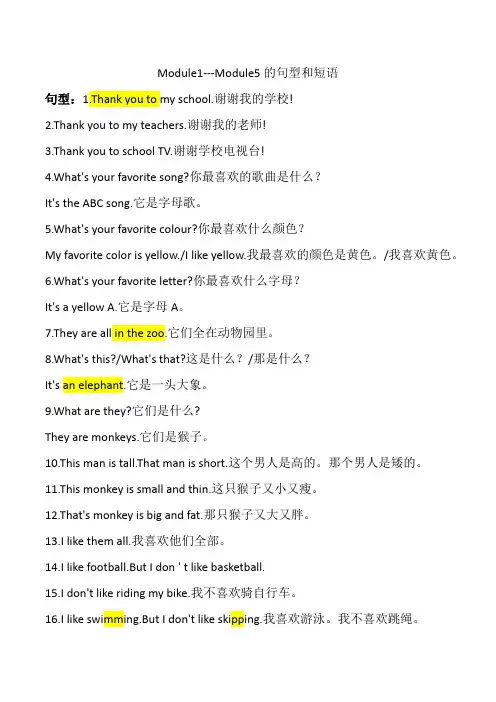
Module1---Module5的句型和短语句型:1.Thank you to my school.谢谢我的学校!2.Thank you to my teachers.谢谢我的老师!3.Thank you to school TV.谢谢学校电视台!4.What's your favorite song?你最喜欢的歌曲是什么?It's the ABC song.它是字母歌。
5.What's your favorite colour?你最喜欢什么颜色?My favorite color is yellow./I like yellow.我最喜欢的颜色是黄色。
/我喜欢黄色。
6.What's your favorite letter?你最喜欢什么字母?It's a yellow A.它是字母A。
7.They are all in the zoo.它们全在动物园里。
8.What's this?/What's that?这是什么?/那是什么?It's an elephant.它是一头大象。
9.What are they?它们是什么?They are monkeys.它们是猴子。
10.This man is tall.That man is short.这个男人是高的。
那个男人是矮的。
11.This monkey is small and thin.这只猴子又小又瘦。
12.That's monkey is big and fat.那只猴子又大又胖。
13.I like them all.我喜欢他们全部。
14.I like football.But I don ' t like basketball.15.I don't like riding my bike.我不喜欢骑自行车。
16.I like swimming.But I don't like skipping.我喜欢游泳。
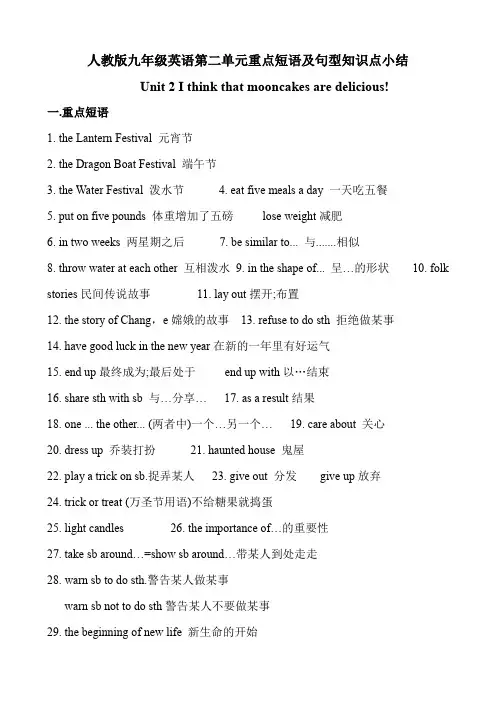
人教版九年级英语第二单元重点短语及句型知识点小结Unit 2 I think that mooncakes are delicious!一.重点短语1. the Lantern Festival 元宵节2. the Dragon Boat Festival 端午节3. the Water Festival 泼水节4. eat five meals a day 一天吃五餐5. put on five pounds 体重增加了五磅lose weight减肥6. in two weeks 两星期之后7. be similar to... 与.......相似8. throw water at each other 互相泼水9. in the shape of... 呈…的形状10. folk stories民间传说故事11. lay out摆开;布置12. the story of Chang,e嫦娥的故事13. refuse to do sth 拒绝做某事14. have good luck in the new year在新的一年里有好运气15. end up最终成为;最后处于end up with以…结束16. share sth with sb 与…分享… 17. as a result结果18. one ... the other... (两者中)一个…另一个… 19. care about 关心20. dress up 乔装打扮21. haunted house 鬼屋22. play a trick on sb.捉弄某人23. give out 分发give up放弃24. trick or treat (万圣节用语)不给糖果就捣蛋25. light candles 26. the importance of…的重要性27. take sb around…=show sb around…带某人到处走走28. warn sb to do sth.警告某人做某事warn sb not to do sth警告某人不要做某事29. the beginning of new life 新生命的开始30. remind sb of … 使某人回想起…31. promise to do sth.承诺做某事32. treat sb. with. 用/以…对待某人二.重点句型1. What do/does+sb. + think of sth. ?例:What does Wu Yu think of this festival?2.宾语从句(P55) (复习直接引语和间接引语)一.连词a.陈述语序(that)b.一般疑问句(if 或whether)c.特殊疑问句(5w,1h)二.陈述语序三.时态可跟that从句做宾语的动词:say, think, insist, wish, hope, demand, imagine, wonder, know, see, believe, agree, admit, deny, expect, explain, order, command, feel, dream, suggest, hear, mean, notice, prefer, request, require, propose, declare, report等例:I don’t know what they are looking for.Could you tell me when the train will leave?注意:当主句谓语动词是think, believe, suppose, expect 等词,而宾语从句的意注意:由whether,if 引导的宾语从句由whether(if)引导的宾语从句,实际上是一般疑问句演变而来的,意思是“是否”。
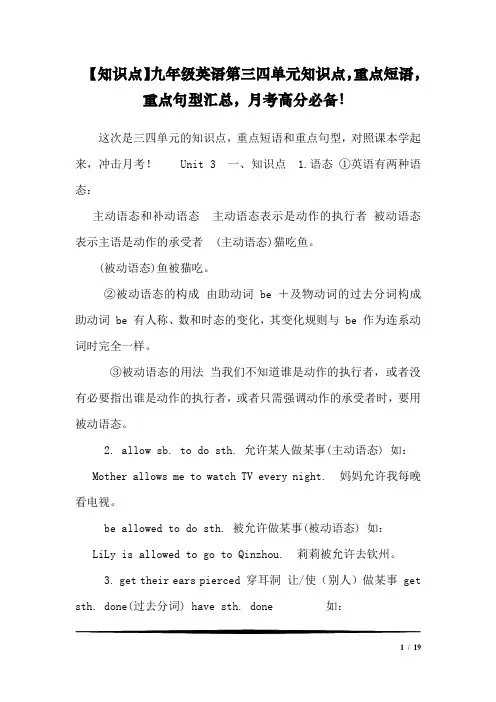
【知识点】九年级英语第三四单元知识点,重点短语,重点句型汇总,月考高分必备!这次是三四单元的知识点,重点短语和重点句型,对照课本学起来,冲击月考! Unit 3 一、知识点 1.语态①英语有两种语态:主动语态和补动语态主动语态表示是动作的执行者被动语态表示主语是动作的承受者 (主动语态)猫吃鱼。
(被动语态)鱼被猫吃。
②被动语态的构成由助动词 be +及物动词的过去分词构成助动词 be 有人称、数和时态的变化,其变化规则与 be 作为连系动词时完全一样。
③被动语态的用法当我们不知道谁是动作的执行者,或者没有必要指出谁是动作的执行者,或者只需强调动作的承受者时,要用被动语态。
2. allow sb. to do sth. 允许某人做某事(主动语态) 如:Mother allows me to watch TV every night. 妈妈允许我每晚看电视。
be allowed to do sth. 被允许做某事(被动语态) 如:LiLy is allowed to go to Qinzhou. 莉莉被允许去钦州。
3. get their ears pierced 穿耳洞让/使(别人)做某事 get sth. done(过去分词) have sth. done 如:1/ 19I get my car repaired. =I have my car repaired. 我让别人修好我的车 I want to have my hair cut. 我要理发. 4. enough 足够形容词+enough 如:beautiful enough 足够漂亮 enough+名词如:enough food 足够食物 enough to 足够去做如:I have enough money to go to Beijing. 我有足够的钱去北京。
She is old enough to go to school. 她够大去读书了。
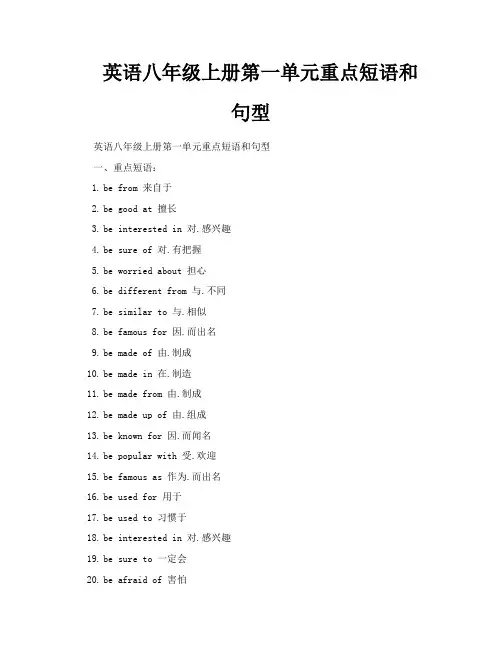
英语八年级上册第一单元重点短语和句型英语八年级上册第一单元重点短语和句型一、重点短语:1.be from 来自于2.be good at 擅长3.be interested in 对.感兴趣4.be sure of 对.有把握5.be worried about 担心6.be different from 与.不同7.be similar to 与.相似8.be famous for 因.而出名9.be made of 由.制成10.be made in 在.制造11.be made from 由.制成12.be made up of 由.组成13.be known for 因.而闻名14.be popular with 受.欢迎15.be famous as 作为.而出名16.be used for 用于17.be used to 习惯于18.be interested in 对.感兴趣19.be sure to 一定会20.be afraid of 害怕21.be proud of 为.而自豪22.be angry with 对.生气23.be happy with 对.满意24.be surprised at 对.感到惊讶25.be pleased with 对.感到高兴26.be worried about 担心27.be strict with 对.要求严格28.be strict in 对.要求严格29.be strict about 对.要求严格30.be strict to 对.要求严格31.be strict on 对.要求严格32.be strict for 对.要求严格33.be strict at 对.要求严格34.be strict in 对.要求严格35.be strict of 对.要求严格36.be strict over 对.要求严格37.be strict through 对.要求严格38.be strict until 对.要求严格39.be strict when 对.要求严格40.be strict where 对.要求严格41.be strict while 对.要求严格42.be strict with regard to 对.要求严格二、重点句型:1.Where are you from? 你来自哪里?2.Where does he come from? 他来自哪里?3.I’m good at playing basketball. 我擅长打篮球。
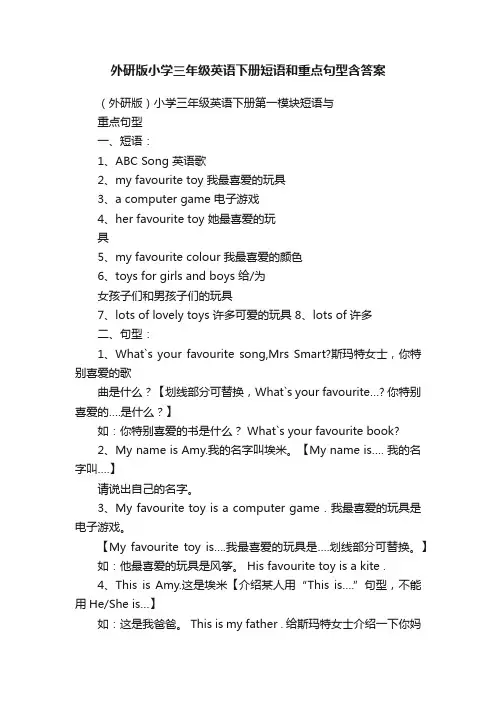
外研版小学三年级英语下册短语和重点句型含答案(外研版)小学三年级英语下册第一模块短语与重点句型一、短语:1、ABC Song 英语歌2、my favourite toy 我最喜爱的玩具3、a computer game 电子游戏4、her favourite toy 她最喜爱的玩具5、my favourite colour 我最喜爱的颜色6、toys for girls and boys 给/为女孩子们和男孩子们的玩具7、lots of lovely toys 许多可爱的玩具 8、lots of 许多二、句型:1、What`s your favourite song,Mrs Smart?斯玛特女士,你特别喜爱的歌曲是什么?【划线部分可替换,What`s your favourite…? 你特别喜爱的….是什么?】如:你特别喜爱的书是什么? What`s your favourite book?2、My name is Amy.我的名字叫埃米。
【My name is…. 我的名字叫….】请说出自己的名字。
3、My favourite toy is a computer game . 我最喜爱的玩具是电子游戏。
【My favourite toy is….我最喜爱的玩具是….划线部分可替换。
】如:他最喜爱的玩具是风筝。
His favourite toy is a kite .4、This is Amy.这是埃米【介绍某人用“This is….”句型,不能用He/She is…】如:这是我爸爸。
This is my father . 给斯玛特女士介绍一下你妈妈。
5、My favourite colour is red .我最喜爱的颜色是红色。
【red 可替换成其他颜色,但注意颜色前不能加“a”】请说出你最喜欢的颜色。
6、Lots of lovely toys.许多可爱的玩具。
【lots of 是“许多”的意思,后面接可数名词的复数形式。
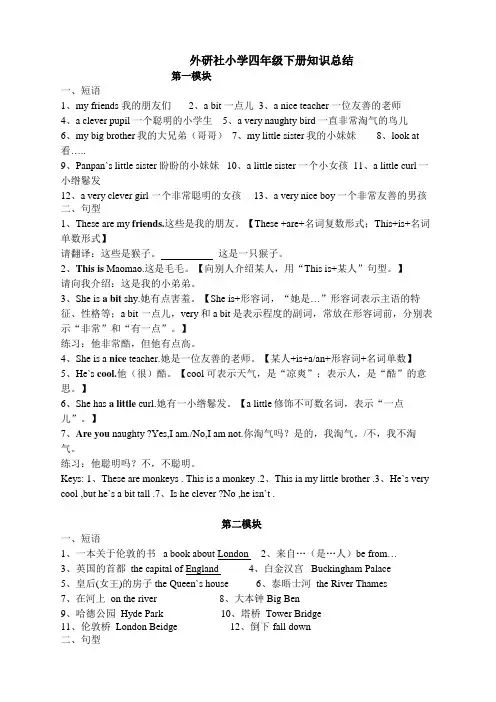
外研社小学四年级下册知识总结第一模块一、短语1、my friends 我的朋友们2、a bit 一点儿3、a nice teacher 一位友善的老师4、a clever pupil 一个聪明的小学生5、a very naughty bird 一直非常淘气的鸟儿6、my big brother我的大兄弟(哥哥)7、my little sister我的小妹妹8、look at 看…..9、Panpan`s little sister 盼盼的小妹妹 10、a little sister 一个小女孩 11、a little curl一小绺鬈发12、a very clever girl 一个非常聪明的女孩 13、a very nice boy一个非常友善的男孩二、句型1、These are my friends.这些是我的朋友。
【These +are+名词复数形式;This+is+名词单数形式】请翻译:这些是猴子。
这是一只猴子。
2、This is Maomao.这是毛毛。
【向别人介绍某人,用“This is+某人”句型。
】请向我介绍:这是我的小弟弟。
3、She is a bit shy.她有点害羞。
【She is+形容词,“她是…”形容词表示主语的特征、性格等;a bit 一点儿,very和a bit是表示程度的副词,常放在形容词前,分别表示“非常”和“有一点”。
】练习:他非常酷,但他有点高。
4、She is a nice teacher.她是一位友善的老师。
【某人+is+a/an+形容词+名词单数】5、He`s cool.他(很)酷。
【cool 可表示天气,是“凉爽”;表示人,是“酷”的意思。
】6、She has a little curl.她有一小绺鬈发。
【a little修饰不可数名词,表示“一点儿”。
】7、Are you naughty ?Yes,I am./No,I am not.你淘气吗?是的,我淘气。
七年级(上册)重点短语和句型StarterUnits1-3重点短语1.anEnglishname一个英文名字2.inEnglish用英语3.anorange一个橘子4.blackandwhite黑白相间重点句型1.Goodmorning!早上好!2.Goodafternoon!下午好!3.Goodevening!晚上好!4.—Howareyou?—I'mfine,thanks./ImOK.——你好吗?——我很好,谢谢。/我还不错。—Yes,Iam.是的,我是。/No,Iamnot.IamLinda.不,我不是。我是琳达。5.—What’sthis/that(inEnglish)?—It’sacup./It’sanorange.——这个/那个(用英语)怎么说?——它是一个杯子。/它是一个橘子。6.—Spellit,please.请拼写它。—C-U-P.7.—Whatcolorisit?—It’sred/blue/yellow.——它是什么颜色的?——它是红色/蓝色/黄色的。8.—Whatcoloristhiskey?—Thekeyisyellow.——这个钥匙是什么颜色?——这个钥匙是黄色的。9.Theorangeisorange.这个橘子是橘色的。Unit1重点短语1.myname我的名字2.yourname你的名字3.hisname他的名字4.hername她的名字5.firstname=givenname名字6.lastname=familyname姓7.inChina在中国8.inClass1,Grade7在七年级1班9.(school)IDcard学生卡10.amiddleschool一所中学11.my(good)friend我的(好)朋友12.her(phone/telephone)number她的(电话)号码重点句型1.I’mGina.我是吉娜。2.MynameisGrace.我的名字叫格蕾丝。3.—AreyouHelen?你是海伦吗?—Yes,Iam.是的,我是。/No,I’mnot.I’mAlice.不,我不是。我是爱丽丝。4.HeisJack.他是杰克。5.SheisKate.她是凯特。6.—Nicetomeetyou.—Nicetomeetyou,too.——见到你很高兴。——见到你我也很高兴。7.—What’shis/hername?—HisnameisDale./HernameisCindy.——他/她叫什么名字?——他叫戴尔。/她叫辛迪。8.—IshePaul?—Yes,heis./No,heisn’t.HeisFrank.——他是保罗么?——是的,他是。/不,他不是。他是弗兰克。10.—IssheSally?
小学英语外研版(三起)四年级下册小学四年级英语下册第二模块重点句型和短语:一、短语1、一本关于伦敦的书 a book about London2、来自…(是…人)be from…3、英国的首都the capital of England4、白金汉宫Buckingham Palace5、皇后(女王)的房子the Queen`s house6、泰晤士河the River Thames7、在河上on the river 8、大本钟Big Ben9、哈德公园Hyde Park 10、塔桥Tower Bridge11、伦敦桥London Beidge 12、倒下fall down二、句型1、What`s this ? 这是什么?【其答句要用“It`s”开头的句子。
】如:What`s this ? It`s a dog . 你来说:这是什么?这是一头大象。
2、It`s a book about London . 它是一本关于伦敦的书。
【London这儿可用其它词替换。
】如:这是一本关于中国的书。
This is a book about China .练习:这是一本关于我妈妈的书。
3、London is the capital of England .伦敦是英国的首都。
【…is the capital of…;…是….的首都/省都】再如:Washington D.C.is the capital of America .华盛顿是美国的首都。
练习:北京是中国的首都。
. 太原是山西的省都。
4、I`m from London .我来自伦敦。
(我是伦敦人)【be 的形式随着人称的变化而变(am 、is、are)】再如:He`s from Beijing .他来自北京。
你说:“我来自上海。
”5、It`s very big and very beautiful .它非常大非常美丽。
【and连接前后划线的部分,可不翻译】再如:This desk is very big and very tall .这张桌子非常大非常高。
外研版七年级英语下册短语及重点句型汇总(Module9)外研版七年级英语下册短语及重点句型汇总odule9Lifehistor【重点短语】attheageof在…岁时 2.SpringFestive春节3.Teacher’sDay教师节4.bedifferentfro与…不同5.oen’sDay妇女节 6.findout发现7.NationalDay国庆节8.ontheInternet在网上9.children’sDay儿童节10.asell 也11.Neyear’sDay新年12.leaveschool离开学校13.ayDay/LabourDay劳动节14.inanyotherlanguages用许多其他的语言15.halfanhour半小时16.halfpastfive五点半17.beorthdoing值得做18.getarried结婚【重点句子】I’ritingabouthiforyEnglishclass.我在写关于他的介绍,上英语课要用的。
ecanfindoutabouthiontheInternet.我们可以在网上找到关于他的资料啊。
Heleftschoolandbeganorattheageof12.他12岁就离开学校开始了工作了。
hatdidhedo?他做过什么?Idon’tnotheexactdate.我不知道确切的日期。
ButhetoothenaearTainandbecaeveryfaousinthe1860s.不过在19世纪60年代,他用了马克•吐温这个名字,并且变得很有名。
Lieanypeoplefourhundredyearsago,Shaespeare’sparentsdidn’tlearntoreadorrite.像四百多年前的许多人一样,莎士比亚的父母不识字。
Atschoolheliedplays,sohedecidedtobeanactorhenhefini shedschoolat14.在他14岁毕业的时候,他决定成为一名演员。
高中英语必修2重点短语句型在高中英语学习中,短语和句型的掌握是非常重要的,它们能够丰富我们的词汇量,扩大我们的语言表达能力。
下面是必修2中的一些重点短语和句型的介绍。
1. make a decision (作出决定)例句: He made a decision to study abroad.2. pay attention to (注意)例句: It's important to pay attention to your health.3. take the opportunity (抓住机会)例句: I took the opportunity to talk to the famous writer.4. develop an interest (培养兴趣)例句: The trip to the museum helped me develop an interest in history.5. be familiar with (熟悉)例句: She is familiar with the process of cooking.6. have difficulty (有困难)例句: I have difficulty understanding this math problem.7. be similar to (类似于)例句: Their ideas are similar to ours.8. provide sb with (为某人提供)例句: The company provides its employees with free lunch.9. be successful in (在...方面成功)例句: He was successful in winning the competition.10. be proud of (为...感到自豪)例句: We are proud of our team's achievement.11. take measures (采取措施)例句: The government took measures to protect the environment.12. be used to (习惯于)例句: I'm used to getting up early in the morning.13. have access to (有权使用)例句: Students have access to the library's resources.14. be aware of (意识到)例句: He is aware of the importance of exercise.15. make progress (取得进步)例句: She has made great progress in her English speaking skills.16. be involved in (参与)例句: Many students are involved in volunteer work. 17. be satisfied with (对...感到满意)例句: I am satisfied with my exam results.18. be famous for (以...而闻名)例句: Paris is famous for its fashion industry.19. be worth doing (值得做)例句: The movie is worth watching.20. be different from (与...不同)例句: The two sisters are quite different from each other.21. be keen on (对...感兴趣)例句: She is keen on playing the piano.22. be in charge of (负责)例句: He is in charge of the sales department.23. be ready to (准备好)例句: We are ready to start the meeting.24. be proud to (自豪地)例句: I am proud to be a member of this team.25. be used for (被用于)例句: This room is used for storage.26. be good at (擅长)例句: She is good at playing basketball.27. be supposed to (应该)例句: Students are supposed to wear uniforms in school.28. be interested in (对...感兴趣)例句: He is interested in learning about different cultures.29. be concerned about (担心)例句: She is concerned about her son's safety.30. be pleased with (对...感到满意)例句: The teacher was pleased with my presentation.这些是高中英语必修2中一些重点短语和句型的介绍,掌握这些表达方式将有助于提高你的英语水平,使你的语言更加地道和流利。
高中英语必考动词短语及100 条重点句型英语必考动词短语一、由be 构成的词组be back / in / out 回来;在家;外出be at home / work 在家;上班be good at 善于;擅长于be careful of 当心;注意;仔细be covered with 被……覆盖be ready for 为……做好准备be surprised (at) 对……感到惊讶be interested in 对……感兴趣be born 出生be on 在进行,在上演be able to do sth 能够做……be afraid of (to do sth) 害怕做某事be angry with sb 生(某人)的气be pleased (with) 对……感到高兴(满意)be famous for 以……而著名be strict in (with) 严格要求be from 来自……be hungry / thirsty / tired 饿了;口渴;疲惫be worried 担忧be (well) worth doing (非常)值得做……be covered with 被……所覆盖……be in (great) need of (很)需要be in trouble 处于困境中be glad to do sth 很高兴做某事be late for……迟到be made of (from) 由……制成be satisfied with 对……感到满意be free 空闲的be (ill) in bed 卧病在床be busy doing (with) 忙于做某事二、由come 构成的词组come back 回来come down 下来come in 进入;进来come on 快;走吧;跟我来come out 出来come out of 从……出来come up 上来come from 来自……三、由do 构成的词组do one's lessons / homework 做功课do more speaking / reading 多做口头练习;朗读do one's best 尽最大的努力做某事do some shopping (cooking reading, cleaning) 买东西(做饭菜;读点书;大扫除)do a good deed (good deeds) 做好事do morning exercises 做早操do eye exercises 做眼保健操四、由give 构成的词组give…sth advice on 给……一些忠告give lessons to 给……上课give in 屈服give up 放弃give sb a chance 给……一次机会give a message to 给……一个口信五、由go 构成的词组go ahead 先走;向前走do to the cinema 看电影go to bed 睡觉(make the bed 整理床铺)go to school (college) 上学go to (the) hospital 去医院看病go over 复习go round 顺便去,绕道走go up 上去go out for a walk 外出散步go on (doing) 继续做某事go on with one's work 继续某人的工作go upstairs / downstairs 上、下楼六、由have 构成的词组have a lesson (lessons) / a meeting 上课;开会have a football match (basketball match) 举行一场足球、篮球赛have dictation 听见have a try 试一试have a good / wonderful time 玩得很开心have a lecture ( a piano concert ) 听讲座have a report ( talk ) on 听一个关于……的报告have a glass of water ( a cup of tea ) 喝一杯水have breakfast / lunch / supper 吃早饭;午饭;晚饭have a meal ( three meals ) 吃一顿饭have a dinner 吃正餐have bread and milk for breakfast 早饭吃面包和牛奶have a headache 头痛have a fever 发烧have a cough 咳嗽have a look 看一看have a rest ( a break ) 休息一会have a talk 谈话have a swim / walk 游泳;散步have sports 进行体育锻炼have a sports meet (meeting) 开运动会have something done 请人做某事have a test / an exam 测试;考验have an idea 有了个主意had better do sth 最好做某事have a word with 与……谈几句话七、由help, keep 引导的词组help sb with sth / help sb do sth 在……方面帮助;帮助某人做某事help oneself to some chicken / fish / meat 请随便吃help each other 互相帮助keep up with 跟上……keep silent / quite 保持沉默keep sb doing sth 使……一直做……keep one's diary 记日记八、由make 引导的词组make a noise 制造噪音make a living 谋生make sb do sth 迫使某人做……make faces 做鬼脸make friends 与……交朋友make a mistake 犯错误make room / space for 给……腾出地方make a sentence with 用……造句make a fire 生火九、由be、make 引导的词组be made from / of 由……制成be made in 在……地方制造look out of (outside) 往外看look up a word (in the dictionary) 查字典look up 往上看look after 照管;照看;照顾look for 寻找look like 看上去像look fine / well / tired / worried 看起来气色好;健康;疲劳;忧郁look out 当心look on…as…把……当作……来看待look around 朝四周看look at 看着……十、由put 引导的词组put on 穿上put up 建造;搭起,挂起,举起,张贴put into 使进入,输入put one's heart into 全神贯注于……put…down…把……放下put…into…把……译成十一、由set、send 引导的词组set up 竖起,建起set off 出发,动身set out 出发set an example for 为……树立榜样send for 派人去请sent out 放出,发出sent up 发射十二、由take 引导的词组take one's advice 听从某人劝告take out 拿出;取出take down 拿下take place 发生take one's place 代替某人的职务take the place of 代替……take a walk / rest 散步;休息take it easy 别紧张take sth with sb 随身携带take sb to a park 带某人去公园take care of 关心;照顾;保管take a look at 看一看take an exam 参加考试take away 拿走take back 收回,带回take hold of 抓住……take off 脱下take part in 积极参加活动take photos 拍照take some medicine 服药take a bus 乘车十三、由turn、play 引导的词组turn on 开灯turn off 关灯turn in 交出;上交turn into 变成turn to 翻到;转向turn down 把音量调低turn over 把……翻过来play basketball 打篮球play games 做游戏play the piano 弹钢琴play with snow 玩雪play a joke on 对……开玩笑十四、由其他动词构成的词组。
仁爱版七年级下册英语重点知识点总结(短语、句型、语法)Unit 5 Topic 1重点短语:1. on foot 步行go …on foot = walk ( to )…2.at the school gate在学校大门口3.on weekdays在平日,在工作日4.on weekends=on the weekend在周末5.after school 放学后6.after class 下课后7.after breakfast / lunch / supper早餐/ 午餐 / 晚餐后8.in one's free time在某人空闲时间9.have a rest 休息一下10.read books 读书11.go swimming 去游泳12.listen to music 听音乐13.watch TV 看电视14.do(one’s) homework 做作业15.go to the zoo / park去动物园/ 公园16.once a week 一周一次17.every day 每天18.have classes 上课19.for a little while 一会儿20.go to bed 上床睡觉e on 快点,加油,来吧22.get up 起床23.talk with / to s b.与某人谈话24.at school 在学校、在上课25.go to school 去上学26. and so on ……等等重点句型:1. --Happy New Year! --The same to you.2.--Your new bike looks very nice. --Thank you3.--How do you usually come to school? --I usually come to school by subway.4.--How often do you go to the library? --Once/Twice/Three timesa week/Very often/Every day/Seldom5.The early bird catches the worm.(谚语) 笨鸟先飞6.Work / Study must come first.工作/ 学习必须放在第一位!7.Classes begin at eight.=Class begins at eight.8.What time does the class begin?What time do the classes begin?9.We have no more time.我们没有更多的时间了。
Module 3 Unit 1 重点词组 1. that far=so far 那么远 2. glance at 瞥见,看一眼 3. in sight 在视野之内 out of sight 在视野之外 at first sight 第一眼就,即刻的 at sight of… 一看见…… lose sight of… 不再看见……失去某人的音讯 4. set off 出发,动身 set out to do 着手做…… set aside 把……放在一旁 5. by the time (连词)在……之前 6. feel a rough hand brush her face 觉得有一只粗糙的手拂了一下她的脸 7. feel heart beating with fear 感到心由于自己害怕在砰砰跳, 8. wish for… 希望得到…… 9. hold her still 使她一动也不动 10. reach out (for)… 伸手拿…… 11. stare(up) at 盯着看 12. come to one’s aid 前来帮助 13. watch out for 当心…… 14.a fog this bad 像这样糟糕的雾 15. pay back 偿还 pay off = be rewarded 得到回报;还清 16.get across the road 穿过马路 17.except in a fog like this 除非在这样的大雾里 18.have…in common 有共同之处 19.hear the sound of footsteps approaching 听到脚步声靠近 20.go adj. 变得…… go hungry 变饿 go bad 变糟 go mad 变疯 21.be related to = be linked to 与……相关 22.a question to be answered 一个要被回答的问题 23.have something / nothing to do with… 与……有关/无关 24.make the most of = make the best of =make full use of 充分利用 take advantage of 利用 25.make one’s way to (辛苦地)前进 26.can’t help doing 情不自禁地做某事 27.warm…up 把……加温,使……热心起来 28.get close to 接近…… 29.continue doing/ to do 继续做…… 30.sweat with fear 吓得出汗 31.all of a sudden=suddenly 突然 32.make progress 取得进步 33.apply various methods to do sth 运用各种各样的方法做某事 34.work out a safe treatment plan 制定一个计划 35.be used to do 被用来做 used to do 过去经常做 be used to doing 习惯做…… 36.a chair to sit on 一张用来坐的椅子 a paper to write on 一张可以在上面写字的纸 a pen to write with 一支用来写的钢笔 37.fall asleep 入睡 fall behind 落后于…… fall down 从……落下 fall into a bad habit 养成一个坏习惯 38.offer sb. sth. = offer sth. to sb. 主动提供某人某物 provide /supply sb. with sth 提供某人某物 provide sth. for sb. 提供某人某物 supply sth. to sb. 提供给某人某物 39.mainly because 主要因为 40.be known as 作为……而出名 be known for 因……而出名 be known to 被……熟知 41.be fit to do… 适合做…… 42.be likely to do 可能做…… 43.be attracted to sth. 被……所吸引 44.the following tips 以下的建议 45.hit sb. on the nose 打在某人的鼻子上 catch sb. by the arm 抓住某人的手臂 pull the monkey by the tail 拉猴的尾巴 hit sb. on the face 打某人的脸 pat sb. on the shoulder 拍某人的肩膀 46.stick sb. in the eye 刺某人的眼睛 stick to my plan/principle 坚持我的计划/原则 47.sign language 手势语 48.manage to do… 经过一番努力成功地做某事 49.be grateful to 感激…… 50.in the near future 在不久的将来 51. to one’s surprise 令人惊讶的是 55.last (for) four hours 持续4个小时 56.roll up the paper 卷起这张纸 57.attach sth to sth 把…系到/附到 attach great importance/significance to 重视 58.set the bird loose 松开这只鸟 59.avoid large numbers of people 避免大量的人群 avoid sth/doing 60. reduce the risk of doing/sth 减少…风险 61. recover one’s strength 恢复体力 62. rather than 而不是 63.require sb (not )to do sth 要求某人做某事 64.tolerate the pain 忍受疼痛 重点句子 1. When Polly left home that morning, the city was already covered in a grey mist. (P2 L1) 那天早晨波莉离开家的时候,整个城市早笼罩在一片灰雾中了。 2. She wondered if the buses would still be running. (P2 L 5) 她不知道这个时候公交车是不是还照常运行。 3. Once out the street, she walked quickly towards her usual bus stop. (P2 L 6) 一到街上,波莉就急匆匆地向平常乘车的车站走去。 4. The truth is that the fog is too thick for the bus to run that far. (P2 L 10) 实际情况是雾太大了,公交车去不了那么远。 5. As Polly observed the passengers on the train, she sensed that she was being watched by a tall man in a dark coat. (P2 L 14) 正当波莉打量地铁里的乘客时,她感觉到有一个穿黑色外套的高个子男人在注视着她。 6. While the rest of the passengers were getting out, she glanced at the faces around her. The tall man was nowhere to be seen. (P2 L 16) 当其他的乘客陆续下车的时候,波莉扫视了一下周围的面孔。这时,高个子男人不见了。 7. Outside, the fog lay like a thick, grey cloud. There was no man in sight. Polly set off towards Park Street. (P2 L 19) 外面,大雾就像一片浓密的灰云笼罩着。什么人也看不见。于是,波莉向街心花园走去。 8. A minute before, she had wished for someone to come along. Now she wanted to run, but fear held her still. (P2 L 26) 刚才她还盼望着能有什么人朝她这里走过来,然而现在她想到的是逃跑,只是由于恐惧,她站在那里一动也不能动。 9. Polly found herself staring up at a man standing with his hand resting on her arm. (P2 L 31) 波莉发现自己身边站着一个男人,他的手搭在她的肩膀上。 10. The face that she saw was that of the old man. (P3L 32) 他看到的是老人的脸。 11. It gives me the chance to pay back the help that people give me when it’s sunny. (P2 L 54) 但是这却给我了一个机会,我可以回报在晴天里人们所给予我的帮助。 12. The possibility that pleasant smells might reduce pain has recently been suggested by new research. P 9 L1 最近,新的研究表明令人愉快的香味很可能会减轻疼痛. 13. Doctors asked 20 men and 20 women to keep their hands in very hot water for as long as possible while breathing in different smells. P 9 L4 医生让20个男人和20个女人在闻不同味道时把他们的手尽可能长时间的放在热水里。 14. Scientists are interested in whether the sense of smell is related to pain and whether men and women have the same senses. P 9 L16 科学家们对嗅觉是否与疼痛有关和男人女人是否有相同的感觉很感兴趣。 15. One reason why we become stressed and have high blood pressure is that we misuse our senses in our everyday life. P 11 L 4 我们会有压力和高血压的原因之一是我们在日常生活中误用了我们的感觉 16. She stared at it for a long time. So long, that she fell asleep. P 17 L3 她看了很长时间。 时间太长,她都睡着了。 17. The chances of being attacked by a shark are very small compared to other dangers. P18 L11 相对于其他危险而言,人类遭受鲨鱼攻击的几率其实是很小的。